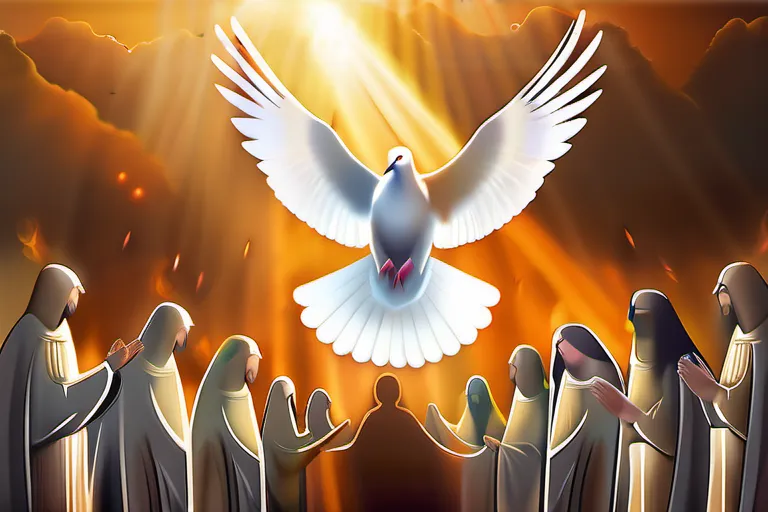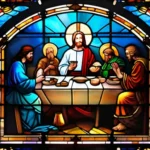Exploring the Holy Spirit’s Descent and Its Impact on Early Christianity
Pentecost is a significant event in Christian history, marking the descent of the Holy Spirit upon the Apostles. This article delves into the significance of Pentecost, its impact on the early Church, and its relevance today.
The Background and Context of Pentecost
The background and context of Pentecost are like a story that unfolds over time, each event building upon the last until it reaches a climax. Let’s dive into this narrative to understand its significance in Christianity.
Imagine you’re walking through the pages of the New Testament, following the life of Jesus from his baptism to his crucifixion and resurrection. His life was marked by wonder and mystery; from turning water into wine to raising the dead. But what happens after he ascends to heaven? How does this affect the lives of those who followed him?
The answer lies in the events surrounding Pentecost, a festival celebrated by Jews as the time when God’s presence was felt among them. For Christians, it became the moment when God’s Spirit descended upon believers, transforming their world forever. This event wasn’t just an anniversary; it was the start of something new and profound.
Consider how Jesus’ resurrection had already brought hope to his followers. They knew he promised they would receive a gift from the Father—what we now know as the Holy Spirit. But until Pentecost, this promise remained a vague hope. The day of Pentecost marked the realization of that promise and the beginning of the Christian church.
Imagine standing with the apostles on that hill in Jerusalem, feeling the tension in the air. What was it like to wait for something you’ve been told about but can’t see? And then suddenly, a sound as loud as a strong wind filled the place. It was as if the very heavens opened up, and a force so powerful it felt like a breath on your face.
What did they see? A manifestation of the Holy Spirit—like tongues of fire dividing and resting upon each person present. This wasn’t just an ordinary experience; it was transformative. The apostles, who had been timid and fearful, were suddenly bold and filled with courage to share their faith with the world.
So, how did this change everything? It marked a shift from personal discipleship to public proclamation. From quiet obedience to loud witness. This descent of the Holy Spirit was like a key unlocking the door to what Jesus had promised. Suddenly, the early Christians were empowered to spread the message far and wide, not just within their community but across different languages and cultures.
In this context, Pentecost became more than just an event; it became a symbol of renewal, transformation, and empowerment. The descent of the Holy Spirit was like a light switching on in the darkest night, illuminating the way forward for a fledgling church that would grow into something monumental.
The Descent of the Holy Spirit
The descent of the Holy Spirit upon the Apostles on the day of Pentecost was nothing short of a cosmic event, as described in the Acts of the Apostles. Imagine a room filled with men and women from various nations, all speaking in their native tongues—how could this be? Was it just a fleeting moment or did something profound and eternal happen?
As the sound like a violent wind swept through the house, the apostles felt as if they were being baptized into a new reality. The room filled with what looked like tongues of fire, each one landing on those present. It was more than a physical sensation; it was an overwhelming spiritual experience that transformed them in ways unimaginable.
Before the day of Pentecost, the apostles were timid and unsure, hesitant to proclaim the good news of Jesus Christ’s resurrection. But now, as they stepped out into the bustling streets of Jerusalem, they spoke with powerful and compelling words. The crowd gathered, marveling at their boldness and the miracles performed before them.
The significance of this event cannot be overstated. It was not just a one-time occurrence but a catalyst for the spread of Christianity throughout the world. The Holy Spirit’s descent on Pentecost marked the beginning of a new era, where believers were empowered to share the Gospel fearlessly and with conviction. Could anything compare to the impact of this divine intervention?
As we reflect on the day of Pentecost, it is clear that the descent of the Holy Spirit was a pivotal moment in Christian history. It transformed not only the apostles but also countless others who came after them, setting the stage for the growth and expansion of Christianity across continents and centuries.
The Effects of the Holy Spirit’s Descent
The effects of the Holy Spirit’s descent on the Apostles were nothing short of transformative, like turning water into wine at a wedding feast. Imagine being filled with the power of God; it was no longer just a theoretical concept but a lived reality. Suddenly, the Apostles found themselves not only talking in tongues but also boldly proclaiming the Gospel to crowds of people from every nation under heaven. How did such a seemingly ordinary group of men transform into fearless missionaries ready to face any challenge?
Before Pentecost, the Apostles had faced constant fear and doubt. They were uncertain about their future and the fate of Jesus’ teachings. But after experiencing the Pentecost event, everything changed. The Holy Spirit’s descent imbued them with a sense of purpose and a confidence that nothing could shake. Their conversations now carried an urgency and passion that resonated deeply with those who heard them.
The immediate impact was profound. The Apostles began to witness the transformation in themselves and their community. They were no longer afraid to speak out against injustice or to challenge the authorities. Instead, they stood firm, inspired by the strength of the Holy Spirit. As the news spread about these ordinary men speaking in languages they had never learned, people couldn’t help but wonder what had happened.
The long-term effects were equally remarkable. The Apostles’ boldness sparked a movement that would soon sweep across the known world. They were like fishermen cast into vast seas of opportunity and challenge, yet they found themselves swimming freely with the grace of the Holy Spirit guiding them. Their fear turned to faith, and their doubt gave way to hope. The early Christian community grew stronger as a result of this divine empowerment.
The Apostles’ experiences after Pentecost serve as powerful reminders of the transformative power of the Holy Spirit. They show that when we embrace His presence in our lives, nothing is impossible. The Church today can draw inspiration from these stories to seek and experience the same empowerment. Can you imagine how differently your life might be if the Holy Spirit were guiding every step? Pentecost offers us a chance to tap into that same divine energy and transform our lives for the glory of God.
Pentecost and the Early Church
Pentecost, often seen as a turning point for early Christianity, marked a pivotal moment that reshaped not just individual lives but the very fabric of the Christian community. Imagine the church before Pentecost as a small, scattered group of believers, unsure and afraid in the face of persecution and uncertainty. Now, picture this group after receiving the Holy Spirit at Pentecost – transformed into a united force with a clear mission and purpose. How did this remarkable event shape the early Christian community?
The descent of the Holy Spirit on Pentecost wasn’t just a one-time miracle; it was a catalyst for profound change. It created an environment where believers could openly share their faith, speaking in tongues as they witnessed the power of the Holy Spirit. This phenomenon wasn’t just about language barriers; it was about breaking down spiritual barriers within the community itself. How did this sudden unity affect those who had once been divided by fear and uncertainty?
Consider the metaphor of a seed planted in barren soil. Before Pentecost, the seeds of faith were scattered but unfulfilled. With the Holy Spirit’s descent, these seeds flourished, growing into a vibrant community rooted in love and unity. The early church began to see explosive growth as new believers joined their ranks, drawn by the powerful witness of those empowered by the Holy Spirit. How did this growth manifest practically within the community?
The story of Pentecost is not just about one significant event but a series of interconnected moments that continue to inspire and guide Christians today. As we reflect on the early church’s journey, it becomes clear how essential Pentecost was in establishing the foundation for Christian unity and mission. By examining this pivotal moment, we can better understand the ongoing significance of the Holy Spirit’s role in our lives today.
So, what lessons can modern Christians learn from the events of Pentecost? How might the power of the Holy Spirit continue to shape and transform us as individuals and communities? These questions echo through time, challenging us to seek the same kind of unity and purpose that defined those early believers. In understanding the significance of Pentecost in Christianity, we find not just a historical event but a timeless call to action.
The Significance of Pentecost Today
How does Pentecost still resonate today in our fast-paced, often fragmented world? In a time where unity seems elusive and truth can be subjective, the significance of Pentecost becomes even more profound. Imagine a community that stands united, not by common bonds or shared backgrounds, but by the power of the Holy Spirit. This unity is what early Christians experienced during Pentecost, and it remains a beacon for us today.
When we think about Pentecost, we often visualize a scene of chaotic yet transformative energy, as described in Acts 2:1-3. The winds of change swept through Jerusalem, filling the believers with the Holy Spirit and enabling them to speak in tongues, or languages they had never learned before. This was more than just linguistic ability; it was a spiritual revolution that broke down barriers and brought people together.
Today, we might wonder: Can this spirit of unity be replicated? How do we bridge divides and foster understanding among different faiths and cultures? The answer lies in recognizing the Holy Spirit as our guide. Just as the apostles were empowered to spread the gospel on that fateful day, so too can believers today feel the stirring of the Holy Spirit within them, urging them to reach out, to listen, and to love beyond their immediate circles.
Moreover, Pentecost teaches us about the importance of listening. The disciples didn’t just speak in tongues; they were also heard by people from various backgrounds. This mutual exchange of language and understanding can inspire today’s churches to engage with diverse communities, fostering not just dialogue but genuine connections based on shared humanity.
So, as we reflect on Pentecost, let us ask ourselves: How can the Holy Spirit continue to shape our lives? Can we allow His presence to transform our hearts and minds, making us more compassionate and inclusive? The journey of faith is not about perfect unity or a single path but about being open to the many ways in which God can work through us. As we step out into the world, may we do so with the same boldness and love that characterized those first believers on the day of Pentecost.
Conclusion: The Power and Unity of the Holy Spirit
As we conclude our exploration of Pentecost and its profound significance, let’s delve into how the Pentecostal experience has shaped the Christian narrative. Could we imagine a world where the early disciples were simply waiting for their leader to return? The events of Pentecost are anything but ordinary; they represent a monumental shift in the course of human history and religious destiny.
The coming of the Holy Spirit, often symbolized by flames or tongues, was more than just an awe-inspiring spectacle. It marked the birth of a new era—the age of the Spirit. This powerful outpouring transcended cultural and linguistic barriers, uniting believers from various backgrounds under one roof of unity. How can we underestimate the transformative power of such an experience in our own lives and communities?
The impact of Pentecost extends far beyond its initial occurrence. It serves as a timeless reminder that the Holy Spirit is not merely a historical figure but remains active and relevant in today’s world. The unity witnessed on that day continues to inspire us, urging us to overcome divisions and embrace one another as brothers and sisters in Christ.
Reflecting on Pentecost, we must ask ourselves: How can we allow the Spirit’s presence to guide our actions and decisions? Can we be agents of unity and peace, just as the early believers were? The power and unity brought by the Holy Spirit are not just historical milestones; they are living realities that beckon us to participate in His ongoing work.
As we embrace these lessons from Pentecost, let us strive to embody the spirit of cooperation and mutual love. The Holy Spirit’s descent at Pentecost is a call to action—let us heed this call and become instruments of His grace in our communities and beyond.
Conclusion
 By understanding the events of Pentecost, we can appreciate the power of the Holy Spirit in our lives and the unity it brings to the Christian community.
By understanding the events of Pentecost, we can appreciate the power of the Holy Spirit in our lives and the unity it brings to the Christian community.











